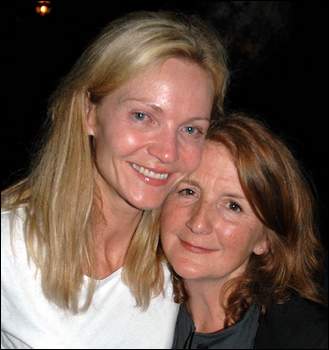TORONTO — Oscar season starts this weekend. The Toronto International Film Festival has become the showcase for ambitious autumn releases by studios hoping for Academy Awards, or at least for good reviews of movies that adults can enjoy without resorting to their child within.
This year, I’m going into the festival having already seen 23 of the films — at Cannes, Telluride or at advance screenings. Before I plunge into 10 days of three to five movies a day, here’s what I know:
* Neve Campbell deserves an Oscar nomination for her fascinating performance as a sexually alive, unforgivingly vengeful rich girl in “When Will I Be Loved.” The best film in the career of writer-director James Toback, it stars Campbell as Vera, the child of millionaires who has a romance with a streetwise con man named Ford (Fred Weller).
Her boyfriend meets an Italian count (Dominic Chianese), who is fascinated by Campbell and offers $1 million to meet her (“no strings — we’ll see what happens”). When Ford tells Vera about the deal, she agrees to meet the count, and then there’s a brilliant scene of astonishingly frank dialogue as these two smart and self-confident people discuss exactly what is being negotiated. It is crucial that Campbell’s character doesn’t need the money.
Spellbinding character
The film develops as a series of surprises; it doesn’t start out as a con, but in responding to a developing situation, it improvises into one, and then into another. All three roles are tricky and difficult, and all three actors are perfectly aimed, but Campbell is the catalyst. In the way she deals with her character’s sexuality, curiosity, intelligence and feelings about being sold, she creates one of the year’s most spellbinding characters.
*While we’re handing out Oscar nominations, what about one for Liam Neeson, in the title role of “Kinsey“? This is a biopic about a difficult, even monomaniacal man, who knew almost everything about human sexuality and almost nothing about human nature. Neeson plays Dr. Alfred C. Kinsey as an obsessive fact-gatherer, who collects a million moths and then vows to collect a million human sexual histories. Heedless of the effect his theories and findings have on ordinary people (and on politicians, and on the foundations that support his research), he makes shocking and controversial statements as if he is simply imparting common sense — which he is, of course, but tell that to heterosexual North Americans unable to imagine sex outside marriage or beyond the missionary position. Neeson makes Kinsey a very particular man, exasperating, brilliant, driven and finally maybe a little mad.
* Joan Allen is amazing in Sally Potter‘s “Yes” (2005). And director Sally Potter is amazing in the way she makes her amazing. Has ever a film looked more clearly and with more love at an actress? Allen, playing most of her key scenes without makeup, sometimes sleepy-eyed, sometimes dripping wet, quite simply becomes an object of carnal embodiment. Who would have thought it of the actress who played Pat Nixon?
In the movie, she escapes from a sterile marriage to a rich man and begins an affair with a lusty Lebanese cook (a surgeon, before he immigrated). They’re forced to confront how their private lives conflict with their public lives, their different ethnicities and religions, and the fact that she has all the money. That’s interesting, but what’s fascinating is the way Joan Allen conveys her character’s discovery of sexual abandon. Maybe she’s the third Oscar nominee from Toronto this year.
* An Oscar nomination in the documentary category may find its way to “Tell Them Who You Are,” Mark Wexler’s touching and truthful documentary about his father, the great cinematographer and political activist Haskell Wexler. Listing his father’s triumphs, including two Oscars, Mark adds, “I am not his fan. I am his son.”
Like many sons of strong and famous fathers, he found it difficult to make his way out of the parental shadow. When he moves from photojournalism into documentary filmmaking, Mark is invading the old man’s turf, but Haskell agrees, reluctantly, to be filmed.
Haskell says in the film that he believes he could have directed most of the films he shot better than their directors, and that is certainly true of this one; he advises, corrects, criticizes, expresses doubts, suggests shots, finds problems with the lighting, and lectures his son on the principles of documentaries.
Told with love, respect
There’s a scene where he has something important he wants to say on camera, and Mark wants him to say it on a balcony at sunset, and this clash between form and content dramatizes all their differences. The movie, seen entirely from Mark’s point of view, is critical at times, but is told with love and respect, and I’m glad Haskell agreed to it. He comes across as a remarkable man, an idealist and a perfectionist –proud, brave and complicated.
One can imagine a boring documentary about career highlights and show-biz memories. Instead, Haskell Wexler is honored with a movie that, with its honesty and sympathy, shows that the father taught the son better than either one of them realizes.
* I’ve got a possible winner in the best foreign film category: Ousmane Sembene’s “Moolaade,” a film of great urgency and rich beauty, from the father of African cinema. The word moolaade means “protection,” which is what a powerful woman in a village extends to four girls who do not want to undergo ritual circumcision. Under tribal custom, she can shield them as long as they don’t stray outside her compound.
This isn’t a solemn social problems picture, but one that resonates with life and sometimes with humor; the costumes bring visual joy into the frame. The story has immediate relevance because female genital mutilation is still practiced in parts of more than 30 African nations.
One wonders what Alfred C. Kinsey would have to say about this film. Or, for that matter, the characters played by Neve Campbell and Joan Allen.












